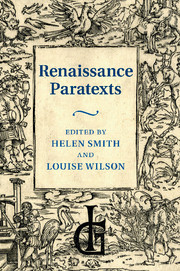Book contents
- Frontmatter
- Contents
- Figures
- Contributors
- Acknowledgements
- Introduction
- Part I Orders of the book
- Part II Making readers
- Chapter 5 Editorial pledges in early modern dramatic paratexts
- Chapter 6 Status anxiety and English Renaissance translation
- Chapter 7 Playful paratexts: the front matter of Anthony Munday’s Iberian romance translations
- Chapter 8 ‘Signifying, but not sounding’: gender and paratext in the complaint genre
- Part III Books and users
- Notes
- Select bibliography
- Index
Chapter 6 - Status anxiety and English Renaissance translation
Published online by Cambridge University Press: 05 August 2011
- Frontmatter
- Contents
- Figures
- Contributors
- Acknowledgements
- Introduction
- Part I Orders of the book
- Part II Making readers
- Chapter 5 Editorial pledges in early modern dramatic paratexts
- Chapter 6 Status anxiety and English Renaissance translation
- Chapter 7 Playful paratexts: the front matter of Anthony Munday’s Iberian romance translations
- Chapter 8 ‘Signifying, but not sounding’: gender and paratext in the complaint genre
- Part III Books and users
- Notes
- Select bibliography
- Index
Summary
When we use the term ‘Renaissance’ for early modern, one thing we might have in mind is translation. Translation represented a process of cultural transmission from the classical to the modern world and a process of exchange within the modern world. Texts were converted from Greek into Latin, from the classical languages to the modern vernaculars and then from one modern language to another. About 20 per cent of the entire book production in England during Elizabeth’s reign, amounting to over a thousand separate items, consists of translation. F. O. Matthiessen observed that, ‘A study of Elizabethan translations is a study of the means by which the Renaissance came to England’, while more recently Warren Boutcher has suggested that we should try to ‘read Renaissance translations as “original” works by those who happened to be translating’. Modern readers would certainly regard works such as North’s Plutarch, Chapman’s Homer, or Florio’s Montaigne as classics of English literature in their own right, but even at the time translation was recognised as a distinct literary form. In his well-known advertisement for the Elizabethan literary revival in Palladis Tamia, Francis Meres included translators alongside his other lists of successful modern English emulations of classical authors, citing Golding and Chapman as well as the translators of Seneca’s tragedies, Harington’s Ariosto, and Thomas Watson’s version of Antigone. Meres’s point is not just that these writers deserve praise for enriching the store of literature in English, but also that they are comparable with the best Roman translators of Greek texts into Latin.
- Type
- Chapter
- Information
- Renaissance Paratexts , pp. 107 - 120Publisher: Cambridge University PressPrint publication year: 2011
- 3
- Cited by



